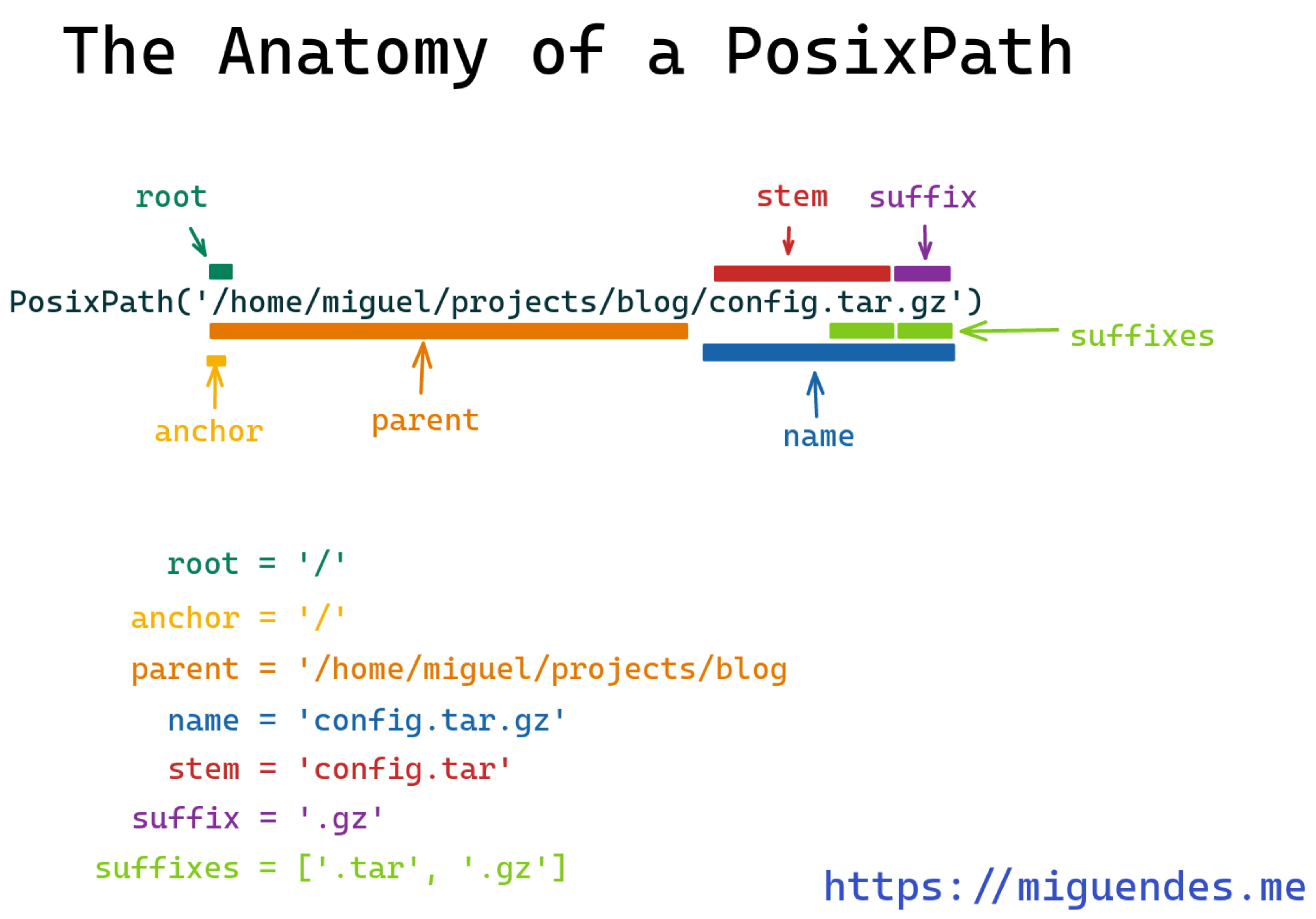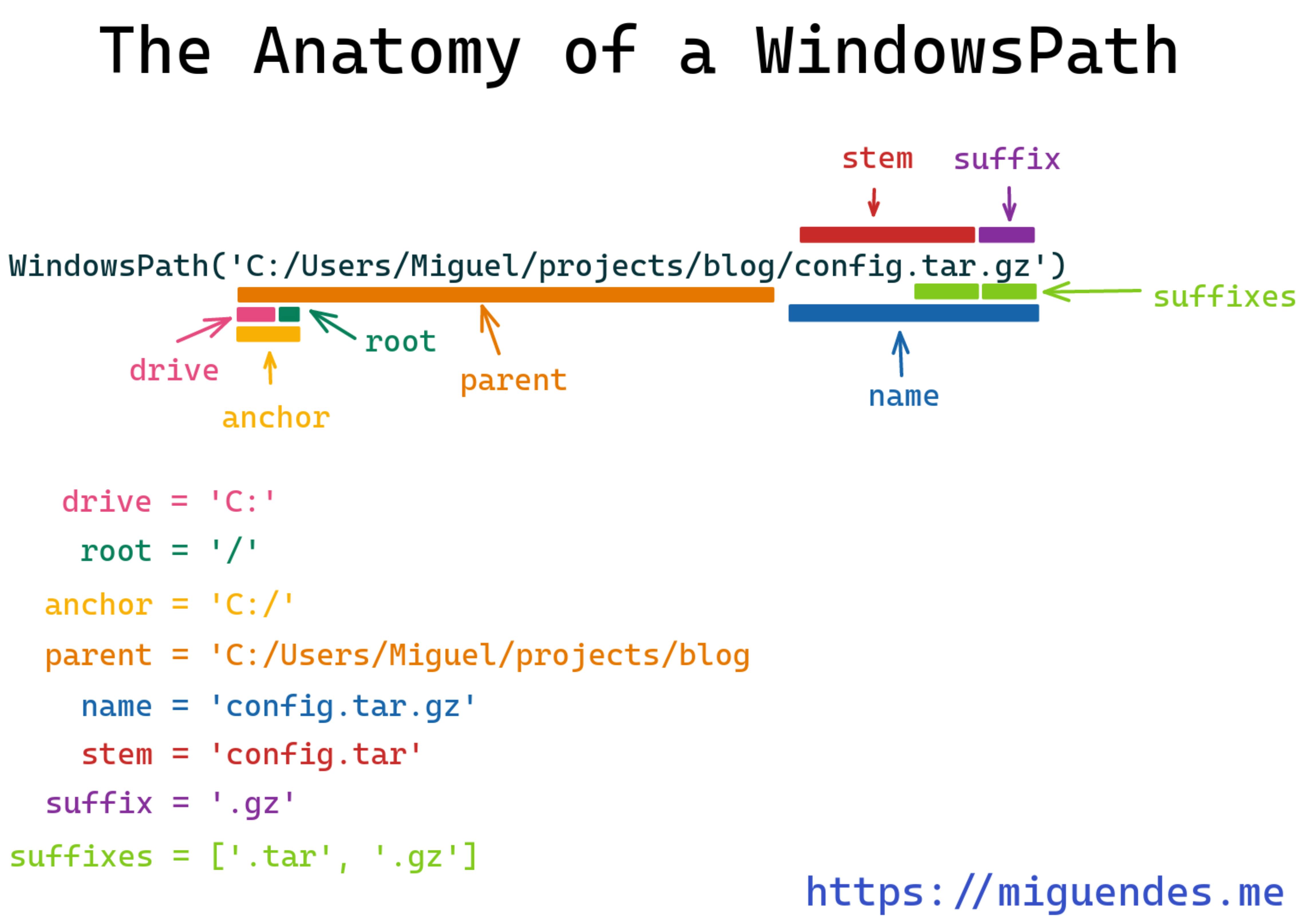os.path & pathlib
| 処理内容 | os及びos.path | pathlib |
|---|---|---|
| 絶対パスへ変換 | os.path.abspath() | Path.resolve() |
| 絶対パスか判定 | os.path.isabs() | PurePath.is_absolute() |
| 権限を変えkる | os.chmod() | Path.chmod() |
| フォルダを作成 | os.mkdir(), os.makedirs() | Path.mkdir() |
| フォルダを削除 | os.rmdir() | Path.rmdir() |
| 名前を変更 | os.rename() | Path.rename() |
| ファイルまたはディレクトリ名前変更 | os.replace() | Path.replace() |
| ファイルを削除 | os.remove(), os.unlink() | Path.unlink() |
| カレントディレクトリ取得 | os.getcwd() | Path.cwd() |
| パスの存在確認 | os.path.exists() | Path.exists() |
先頭の~をホームディレクトリに置換 |
os.path.expanduser() | Path.expanduser(), Path.home() |
| ディレクトリか判定 | os.path.isdir() | Path.is_dir() |
| ファイルか判定 | os.path.isfile() | Path.is_file() |
| シンボリックリンクか判定 | os.path.islink() | Path.is_symlink() |
| ステータス取得 | os.stat() | Path.stat(), Path.owner(), Path.group() |
| パスを結合 | os.path.join() | PurePath.joinpath() |
| ファイル名を取得 | os.path.basename() | PurePath.name |
| 親ディレクトリを取得 | os.path.dirname() | PurePath.parent |
| 同じファイルか判定 | os.path.samefile() | Path.samefile() |
| 拡張子を取得 | os.path.splitext() | PurePath.suffix |
os.path
パスの解析は以下の変数に依存する
os.sep: パスの各部分を分離する記号os.extsep: ファイル名と拡張子を結合する記号os.pardir: 上の階層を表す記号os.curdir: 現在の階層を表す記号
import os
print(f"{os.sep=}") # windowsの場合は"\"
print(f"{os.extsep=}")
print(f"{os.pardir=}")
print(f"{os.curdir=}")
os.sep='/'
os.extsep='.'
os.pardir='..'
os.curdir='.'
split()
import os.path
PATHS = [
'/one/two/three',
'/one/two/three',
'/',
'.',
''
]
for path in PATHS:
print(f"{path!r:>17} : {os.path.split(path)}")
'/one/two/three' : ('/one/two', 'three')
'/one/two/three' : ('/one/two', 'three')
'/' : ('/', '')
'.' : ('', '.')
'' : ('', '')
戻り値はtuple, 二番目の要素はパスの最後の部分、そして一番目の要素は残りの部分
basename()
import os.path
PATHS = [
'/one/two/three',
'/one/two/three',
'/',
'.',
''
]
for path in PATHS:
print(f"{path!r:>17} : {os.path.basename(path)!r}")
'/one/two/three' : 'three'
'/one/two/three' : 'three'
'/' : ''
'.' : '.'
'' : ''
split()[1]に相当
dirname()
import os.path
PATHS = [
'/one/two/three',
'/one/two/three',
'/',
'.',
''
]
for path in PATHS:
print(f"{path!r:>17} : {os.path.dirname(path)!r}")
'/one/two/three' : '/one/two'
'/one/two/three' : '/one/two'
'/' : '/'
'.' : ''
'' : ''
split()[0]に相当
splittext()
import os.path
PATHS = [
'filename.txt',
'filename',
'/path/to/filename.txt',
'/',
'',
'my-archive.tar.gz',
'no-extension.',
]
for path in PATHS:
print(f'{path!r:>25} : {os.path.splitext(path)!r}')
'filename.txt' : ('filename', '.txt')
'filename' : ('filename', '')
'/path/to/filename.txt' : ('/path/to/filename', '.txt')
'/' : ('/', '')
'' : ('', '')
'my-archive.tar.gz' : ('my-archive.tar', '.gz')
'no-extension.' : ('no-extension', '.')
splitはos.sepで分離する、splitextはos.extsepを利用する
commonprefix()
import os.path
paths = ['/one/two/three/four',
'/one/two/threefold',
'/one/two/three/',
]
for path in paths:
print('PATH:', path)
print()
print('PREFIX:', os.path.commonprefix(paths))
PATH: /one/two/three/four
PATH: /one/two/threefold
PATH: /one/two/three/
PREFIX: /one/two/three
パス分離記号を考慮していないので実際存在しない結果になるかもしれない
commonpath()
import os.path
paths = ['/one/two/three/four',
'/one/two/threefold',
'/one/two/three/',
]
for path in paths:
print('PATH:', path)
print()
print('PREFIX:', os.path.commonpath(paths))
PATH: /one/two/three/four
PATH: /one/two/threefold
PATH: /one/two/three/
PREFIX: /one/two
この関数は考慮している
join()
import os.path
PATHS = [
('one', 'two', 'three'),
('/', 'one', 'two', 'three'),
('/one', '/two', '/three'),
]
for parts in PATHS:
print(f'{parts} : {os.path.join(*parts)!r}')
('one', 'two', 'three') : 'one/two/three'
('/', 'one', 'two', 'three') : '/one/two/three'
('/one', '/two', '/three') : '/three'
頭文字はos.sepのパラメータがあったら、その前のパラメータは捨てられる
expanduser()
import os.path
for user in ['', 'maozhongfu', 'nosuchuser']:
lookup = '~' + user
print(f'{lookup!r:>15} : {os.path.expanduser(lookup)!r}')
'~' : '/Users/maozhongfu'
'~maozhongfu' : '/Users/maozhongfu'
'~nosuchuser' : '~nosuchuser'
~はユーザのディレクトリに変換される、見つからない場合はそのまま戻る
expandvars()
/path/to/VALUE
shellの中の環境変数を解析する
normpath()
import os.path
PATHS = [
'one//two//three',
'one/./two/./three',
'one/../alt/two/three',
]
for path in PATHS:
print(f'{path!r:>22} : {os.path.normpath(path)!r}')
'one//two//three' : 'one/two/three'
'one/./two/./three' : 'one/two/three'
'one/../alt/two/three' : 'alt/two/three'
os.curdir,os.pardirは解析され展開する
normcase()
import os.path
path_1 = r'C:\User\admin\Documents'
# 大文字は小文字に変更される
print(f"{path_1!r:20} -> {os.path.normcase(path_1)}")
path_2 = '/hoMe/UseR/'
# slashはbackslashになる
print(f"{path_2!r:20} -> {os.path.normcase(path_2)}")
path_3 = r'C:\Users/Desktop'
# 統一される
print(f"{path_3!r:20} -> {os.path.normcase(path_3)}")
'C:\\User\\admin\\Documents' -> c:\user\admin\documents
'/hoMe/UseR/' -> \home\user\
'C:\\Users/Desktop' -> c:\users\desktop
abspath()
import os
import os.path
os.chdir('/usr')
PATHS = [
'.',
'..',
'./one/two/three',
'../one/two/three',
]
for path in PATHS:
print(f'{path!r:>21} : {os.path.abspath(path)!r}')
'.' : '/usr'
'..' : '/'
'./one/two/three' : '/usr/one/two/three'
'../one/two/three' : '/one/two/three'
getatime(), getmtime(), getctime(), getsize()
%%writefile foo.py
import os.path
import time
print('File :', __file__)
print('Access time :', time.ctime(os.path.getatime(__file__)))
print('Modified time:', time.ctime(os.path.getmtime(__file__)))
print('Change time :', time.ctime(os.path.getctime(__file__)))
print('Size :', os.path.getsize(__file__))
Writing foo.py
File : /Users/maozhongfu/GitHub/Python/ファイルとディレクトリ/foo.py
Access time : Thu Nov 5 02:07:33 2020
Modified time: Thu Nov 5 02:07:31 2020
Change time : Thu Nov 5 02:07:31 2020
Size : 306
os.path.getatime(): ファイルの最後のアクセル時間(access)os.path.getmtime(): ファイルの最後の変更時間(modify)os.path.getctime(): ファイルの作られる時間(create)os.path.getsize(): ファイルの大きさ(Bytes)
isX(), exists(), lexists()
%%writefile foo.py
import os.path
FILENAMES = [
__file__,
os.path.dirname(__file__),
'/',
'./broken_link',
]
for file in FILENAMES:
print('File : {!r}'.format(file))
print('Absolute :', os.path.isabs(file))
print('Is File? :', os.path.isfile(file))
print('Is Dir? :', os.path.isdir(file))
print('Is Link? :', os.path.islink(file))
print('Mountpoint? :', os.path.ismount(file))
print('Exists? :', os.path.exists(file))
print('Link Exists?:', os.path.lexists(file))
print()
Writing foo.py
File : '/Users/maozhongfu/GitHub/Python/ファイルとディレクトリ/foo.py'
Absolute : True
Is File? : True
Is Dir? : False
Is Link? : False
Mountpoint? : False
Exists? : True
Link Exists?: True
File : '/Users/maozhongfu/GitHub/Python/ファイルとディレクトリ'
Absolute : True
Is File? : False
Is Dir? : True
Is Link? : False
Mountpoint? : False
Exists? : True
Link Exists?: True
File : '/'
Absolute : True
Is File? : False
Is Dir? : True
Is Link? : False
Mountpoint? : True
Exists? : True
Link Exists?: True
File : './broken_link'
Absolute : False
Is File? : False
Is Dir? : False
Is Link? : False
Mountpoint? : False
Exists? : False
Link Exists?: False
pathlib
参考文档:pathlib cookbook


OOPの考え方でAPIを構築、解析; 文字列の処理よりレベル高い
pathlib.Path
pathlib.PosixPath
pathlib.PurePath
pathlib.PurePosixPath
pathlib.PureWindowsPath
pathlib.WindowsPath
PurePosixPathとPureWindowsPathはただ文字列を処理するだけでファイルシステムと関わらない
一方、実際のファイルシステムを操作する際、Pathを利用すべき
基本OSによってPosixPathやWindowsPathのインスタンスを作成する
汎用プロパティ
パスは変更不可(immutable)でハッシュ可能(hashable)
基本OS同じの場合は比較などできる
from pathlib import PurePosixPath, PureWindowsPath
print(PurePosixPath('foo') == PurePosixPath('FOO'))
print(PureWindowsPath('foo') == PureWindowsPath('FOO'))
print(PureWindowsPath('FOO') in { PureWindowsPath('foo') })
print(PureWindowsPath('C:') < PureWindowsPath('d:'))
print(PureWindowsPath('foo') == PurePosixPath('foo'))
# print(PureWindowsPath('foo') < PurePosixPath('foo')) # エラーが起こる
False
True
True
True
False
"/"演算子
import pathlib
usr = pathlib.PurePosixPath('/usr')
print(usr)
usr_local = usr / 'local' # os.path.join()と同じ
print(usr_local)
usr_share = usr / pathlib.PurePosixPath('share')
print(usr_share)
root = usr / '..'
print(root)
etc = root / '/etc/'
print(etc)
# Windowsの場合は、ローカルルータを変えても前のドライバーが残る
print(pathlib.PureWindowsPath('c:/Windows') / '/Program Files')
/usr
/usr/local
/usr/share
/usr/..
/etc
resolve()
import pathlib
usr_local = pathlib.Path('/usr/local')
share = usr_local / '..' / 'share'
print(share.resolve()) # 解析される
/usr/share
joinpath()
import pathlib
root = pathlib.PurePosixPath('/')
subdirs = ['usr', 'local']
usr_local = root.joinpath(*subdirs)
print(usr_local)
/usr/local
with_name(), with_suffix()
import pathlib
ind = pathlib.PurePosixPath('source/pathlib/index.rst')
print(ind)
py = ind.with_name('pathlib_from_existing.py')
# os.path.join(os.path.dirname(ind), 'pathlib_from_existing.py')と同じ
print(py)
pyc = py.with_suffix('.pyc')
# os.path.splitext(py)[0] + ".pyc"と同じ
print(pyc)
source/pathlib/index.rst
source/pathlib/pathlib_from_existing.py
source/pathlib/pathlib_from_existing.pyc
parts
('/', 'usr', 'local')
parent, parents
import pathlib
p = pathlib.PurePosixPath('/usr/local/lib')
print(f'{p.parent}')
print('\nhierarchy:')
for up in p.parents:
print(up)
/usr/local
hierarchy:
/usr/local
/usr
/
name, suffix, suffixes, stem
import pathlib
p = pathlib.PurePosixPath('./source/pathlib/pathlib_name.tar.gz')
print(f'path : {p}')
print(f'name : {p.name}')
print(f'suffix: {p.suffix}')
print(f'suffixes: {p.suffixes}')
print(f'stem : {p.stem}')
path : source/pathlib/pathlib_name.tar.gz
name : pathlib_name.tar.gz
suffix: .gz
suffixs: ['.tar', '.gz']
stem : pathlib_name.tar
home(), cwd()
import pathlib
home = pathlib.Path.home()
print('home: ', home)
cwd = pathlib.Path.cwd()
print('cwd : ', cwd)
home: /Users/maozhongfu
cwd : /Users/maozhongfu/GitHub/Python/ファイルとディレクトリ
iterdir()
codecs.ipynb
os.path&pathlib.ipynb
io.ipynb
glob.ipynb
shutil.ipynb
glob()
如果要递归的检索所有子目录,使用rglob()方法
../pip.ipynb
../typing.ipynb
read_bytes(), read_text(), write_bytes(), write_text()
import pathlib
f = pathlib.Path('example.txt')
f.write_bytes('This is the content'.encode('utf-8'))
with f.open('r', encoding='utf-8') as handle:
print(f'read from open(): {handle.read()!r}')
print(f'read_text(): {f.read_text("utf-8")!r}')
read from open(): 'This is the content'
read_text(): 'This is the content'
mkdir(), rmdir()
import pathlib
p = pathlib.Path('example_dir')
print(f'Creating {p}')
p.mkdir(exist_ok=True) # os.makedirs(p, exist_ok=True)と同じ
print(f'Removing {p}')
p.rmdir()
Creating example_dir
symlink_to()
import pathlib
p = pathlib.Path('example_link')
p.symlink_to('glob.ipynb')
print(p)
print(p.resolve().name)
example_link
glob.ipynb
as_posix(), as_uri()
from pathlib import PurePosixPath, PureWindowsPath
p = PureWindowsPath('c:\\windows')
print(f"{p!r:25} -> {p.as_posix()}")
p = PurePosixPath('/etc/passwd')
print(f"{p!r:25} -> {p.as_uri()}")
p = PureWindowsPath('c:/Windows')
print(f"{p!r:25} -> {p.as_uri()}")
PureWindowsPath('c:/windows') -> c:/windows
PurePosixPath('/etc/passwd') -> file:///etc/passwd
PureWindowsPath('c:/Windows') -> file:///c:/Windows
isX()
import itertools
import os
import pathlib
root = pathlib.Path('test_files')
# 前の結果を消す
if root.exists():
for f in root.iterdir():
f.unlink()
else:
root.mkdir()
# テストファイルを作る
(root / 'file').write_text('This is a regular file', encoding='utf-8')
(root / 'symlink').symlink_to('file')
os.mkfifo(str(root / 'fifo'))
to_scan = itertools.chain(
root.iterdir(),
[pathlib.Path('/dev/disk0'),
pathlib.Path('/dev/console')],
)
hfmt = '{:18s}' + (' {:>5}' * 6)
print(hfmt.format('Name', 'File', 'Dir', 'Link', 'FIFO', 'Block',
'Character'))
print()
fmt = '{:20s} ' + ('{!r:>5} ' * 6)
for f in to_scan:
print(fmt.format(
str(f),
f.is_file(),
f.is_dir(),
f.is_symlink(),
f.is_fifo(),
f.is_block_device(),
f.is_char_device(),
))
Name File Dir Link FIFO Block Character
test_files/symlink True False True False False False
test_files/file True False False False False False
test_files/fifo False False False True False False
/dev/disk0 False False False False True False
/dev/console False False False False False True
stat(), lstat()
%%writefile foo.py
import pathlib
import sys
import time
if len(sys.argv) == 1:
filename = __file__
else:
filename = sys.argv[1]
p = pathlib.Path(filename)
stat_info = p.stat()
print(f'{filename}:')
print(' Size:', stat_info.st_size)
print(' Permissions:', oct(stat_info.st_mode))
print(' Owner:', stat_info.st_uid)
print(' Device:', stat_info.st_dev)
print(' Created :', time.ctime(stat_info.st_ctime))
print(' Last modified:', time.ctime(stat_info.st_mtime))
print(' Last accessed:', time.ctime(stat_info.st_atime))
Writing foo.py
/Users/maozhongfu/GitHub/Python/ファイルとディレクトリ/foo.py:
Size: 531
Permissions: 0o100644
Owner: 501
Device: 16777220
Created : Thu Nov 5 03:23:05 2020
Last modified: Thu Nov 5 03:23:05 2020
Last accessed: Thu Nov 5 03:23:07 2020
owner(), group()
%%writefile bar.py
import pathlib
p = pathlib.Path(__file__)
print(f'{p} is owned by {p.owner()}/{p.group()}')
Writing bar.py
/Users/maozhongfu/GitHub/Python/ファイルとディレクトリ/bar.py is owned by maozhongfu/staff
touch()
import pathlib
import time
p = pathlib.Path('touched')
if p.exists():
print('already exists')
else:
print('creating new')
p.touch()
start = p.stat()
time.sleep(1)
p.touch()
end = p.stat()
print('Start:', time.ctime(start.st_mtime))
print('End :', time.ctime(end.st_mtime))
creating new
Start: Thu Nov 5 03:27:34 2020
End : Thu Nov 5 03:27:35 2020
chmod()
import os
import pathlib
import stat
# 新しいテストファイルを作る
f = pathlib.Path('pathlib_chmod_example.txt')
if f.exists():
f.unlink()
f.write_text('contents')
# statでファイルの権限を確認する
existing_permissions = stat.S_IMODE(f.stat().st_mode)
print('Before: {:o}'.format(existing_permissions))
if not (existing_permissions & os.X_OK):
print('Adding execute permission')
new_permissions = existing_permissions | stat.S_IXUSR
else:
print('Removing execute permission')
# xor でexe権限を消す
new_permissions = existing_permissions ^ stat.S_IXUSR
# 権限を修正する
f.chmod(new_permissions)
after_permissions = stat.S_IMODE(f.stat().st_mode)
print('After: {:o}'.format(after_permissions))
Before: 644
Adding execute permission
After: 744